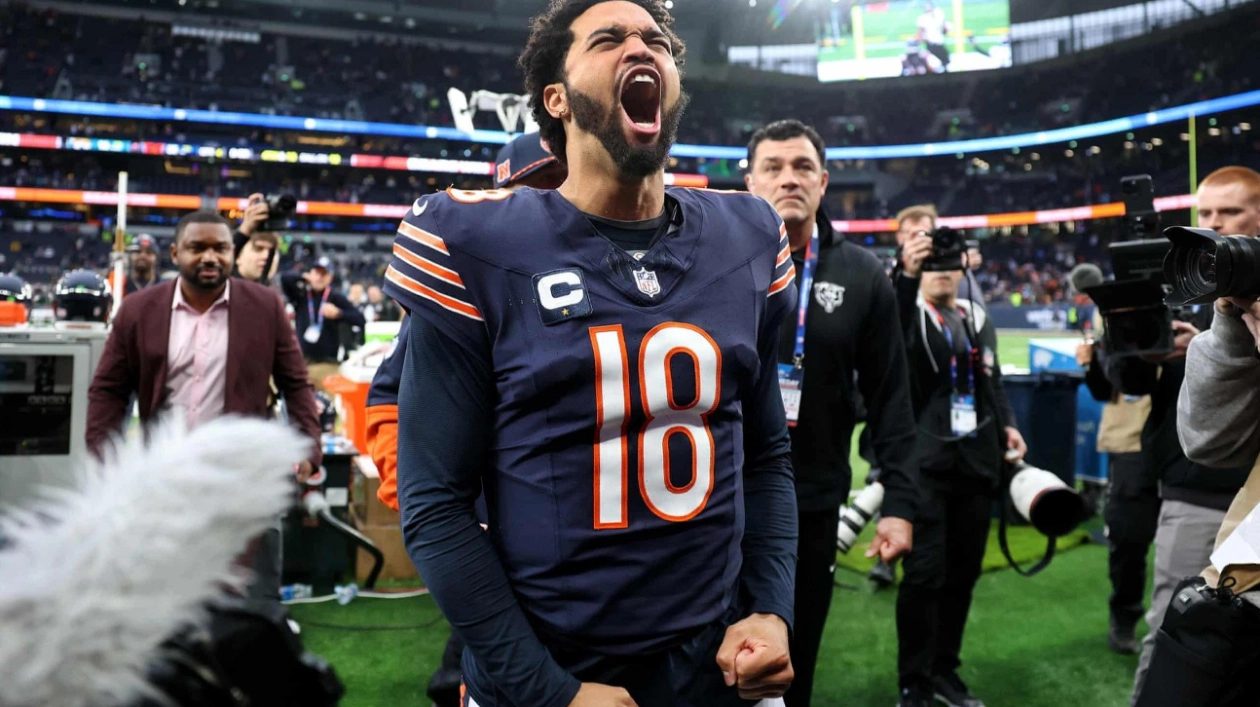Williams entered the NFL with immense expectations, often compared to Patrick Mahomes and touted as a player who could transform Chicago into a playoff contender almost single-handedly. Thirteen weeks into the season, the Bears have struggled. The defense remains strong, but the offense has been a disaster for much of the year. The team has fired its head coach and offensive coordinator, the promised offensive weapons have underperformed, and Williams' offensive line has faltered. However, Williams must also take some responsibility; he oscillated between trying to do too much and not enough, losing the magic he showed in college as he became too reliant on the pocket and a flawed system. Since the Bears replaced Shane Waldron with Thomas Brown as play-caller in Week 9, things have started to improve. In his last three games, Williams has shown more freedom, speeding up his process and delivering the ball on time. Before Brown's arrival, Williams' internal clock was off, with five games averaging over 3.4 seconds to throw, nearly a full second above the league average. Now, he has reduced his average time to throw by almost a full second, showcasing a daring style that uses unconventional arm angles to make passes even the best quarterbacks can't. Despite the early struggles, Williams is on track for a 3,700-yard, 20-touchdown, seven-interception season, which would be close to CJ Stroud's impressive rookie campaign last year. The arrow is pointing up for Williams, though inconsistency remains.
Daniels started the season on a historic pace, quickly moving out of the Rookie of the Year conversation and into MVP consideration. He slowed down mid-season due to a rib injury and defensive adjustments, but returned to form in Week 13 against the Titans, displaying the maturity of a veteran starter. Daniels' game is explosive, with a quick release, lightning-fast reads, and lethal open-field running. Despite the highlight plays, he has also proven efficient and accurate, ranking fourth in the league in adjusted completion percentage, ahead of Mahomes, Lamar Jackson, and Joe Burrow. Washington entered the season with minimal expectations, hoping Daniels would show flashes and improve over time. Instead, he has led the Commanders into an unexpected playoff race, transforming the league's most beleaguered franchise into a must-watch team.
Maye was dropped into one of the most dysfunctional situations in the NFL. While Williams had to deal with a chaotic offense and questionable coaching decisions, he at least had starting-caliber receivers and a strong defense. Maye had nothing. The New England roster is one of the league's worst, with the offensive line ranking dead last in every metric. The defense has shown flashes but hasn't been enough to offset the offensive shortcomings. Yet, since Maye took over as starter in Week 6, there has been an immediate uptick in production. Before Maye, the Patriots ranked 28th in EPA/play; since then, they've moved up to 23rd, showing the rookie's impact. Maye has been as advertised: a serial gambler, willing to take shots downfield despite some boneheaded decisions. He has paired highlight-reel throws with enough consistency to keep the Patriots competitive, making plays with his legs when needed. His completion percentage over expectation is ahead of Josh Allen, Kyler Murray, and Justin Herbert, despite being hit at one of the highest rates in the league. Given the circumstances, it's been a triumph.
Nix's season has been a rollercoaster, starting with a panicked performance, stabilizing with Sean Payton's offensive adjustments, and culminating in glimpses of stardom over the last month. The game has slowed down for Nix, allowing him to make smart decisions and attack downfield more aggressively. His average depth of target against the Browns was his highest since college. Nix looks comfortable, waiting for plays to develop rather than rushing or fleeing the pocket early. One of the most audacious throws from any rookie this season came from Nix, showcasing Payton's trust in his young quarterback. Despite long-term question marks, especially under pressure, Nix has shown significant growth. Even the strongest skeptics should start believing in Nix.
Atlanta's decision to draft Penix No. 8 overall will always be linked to the team signing Kirk Cousins to a four-year, $180m contract. The opportunity cost of passing up impact defensive linemen has been steep and could cost the Falcons the NFC South. However, drafting Penix provided an insurance policy on Cousins, which now looks increasingly sound. In his last three games, Cousins has thrown zero touchdowns and turned the ball over 10 times, with his arm strength deteriorating and poor decisions being punished. We haven't seen enough of Penix to know if he will be a short-term upgrade over Cousins or the long-term answer. But with Cousins' lack of mobility and failing arm, Atlanta should start finding those answers now.
Source link: https://www.theguardian.com






